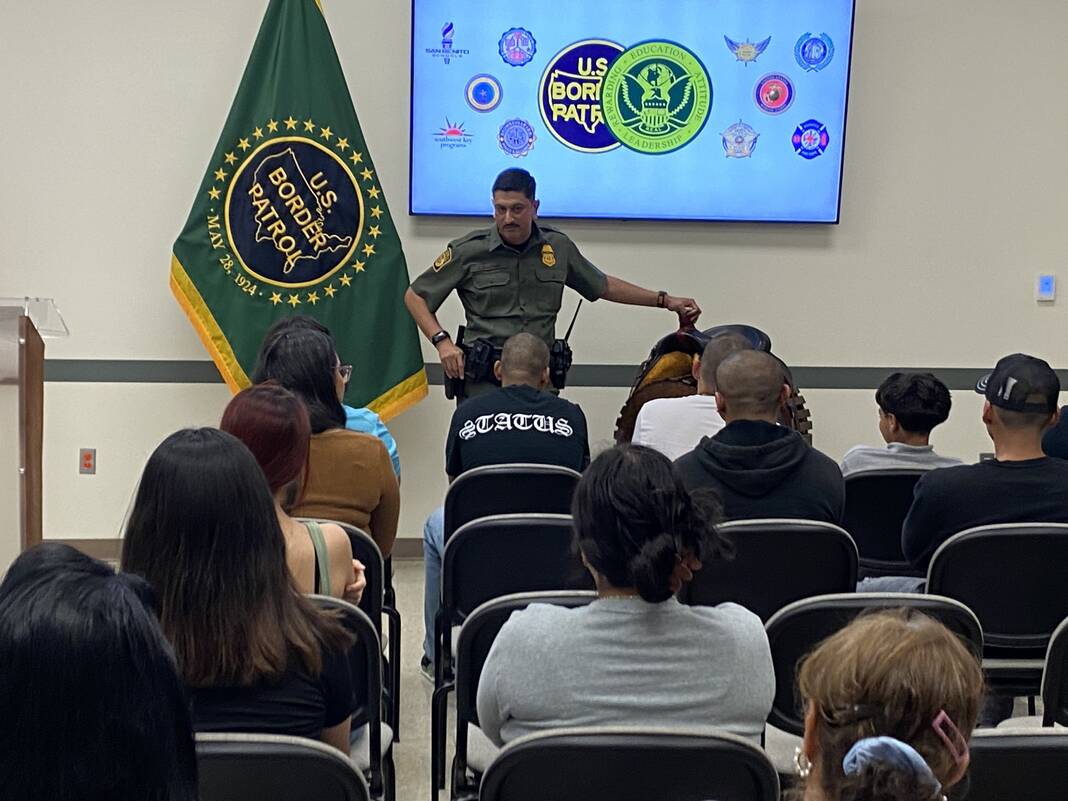|
Only have a minute? Listen instead
Getting your Trinity Audio player ready...
|

BROWNSVILLE — Brianna Garcia sat nervously at first and then seemed relaxed with the idea that her life was beginning to change and move in a direction of success.
Brianna, 16, had just begun the second class of the of R.E.A.L Mission Program implemented by the U.S. Bureau of Customs and Border Protection. The opening ceremony Monday evening took place at the Fort Brown Border Patrol Station at 3305 S. Expressway 83.
The program addresses many issues facing some juveniles, but one of the primarily issues is that of vaping THC, the active ingredient in marijuana. Such was the case of Brianna.
“Once I got arrested I really … it was something scary,” said Brianna, a sophomore. She is one of 21 students entering the six-week program.
R.E.A.L. stands for Rewarding Education Attitude Leadership, said Agent Joe Garcia, lead instructor.
“The purpose of the program is to work with at-risk kids identified by juvenile judges or the school districts who can get some benefits by completing this program,” Garcia said.
The program has a series of activities for the students. Presenters will come in and talk to the kids about such matters as dealing with triggers of past traumatic events and their connections to such self-destructive behaviors as substance abuse, specifically vaping.
“All of us have triggers,” Garcia said. “Sometimes we’re just not self-aware of what might set us off. We need to be aware of it, know how to cope with it, stay ahead of it. Sometimes in can be something as simple as smells. You smell something, it can remind you of a certain traumatic experience. You just remove yourself from that situation.”
Especially crucial in the program is the prevention of vape pen use, which is a felony.
Agent Jose Castro stood before the kids and their parents and other relatives and perhaps even friends and spoke of the gravity of a felony on a juvenile record. A felony could keep them out of the military, out of the medical profession, out of law enforcement, and even some universities.
Garcia said the program also introduced students to the greater opportunities available to them if they stay on a right path.
“These kids can go to a four-year college, that’s amazing,” he said. “But there are also technical schools that are out there for them. There’s military, there’s law enforcement, there are a variety of of jobs and things that they can be doing to be considered successful.”
To that end, firefighters speak to the kids about their profession, but they take it a step further and teach them how to apply CPR and tourniquets.
Castro, having come from the same background as many of the students and families, laughed and cajoled with them in a manner they could appreciate. He made a connection with them they could understand, and absorbed more fully the importance of his more serious admonitions about what was at stake and what had to be done to avert failure.
“That’s not the road trip I want you to take,” he said.
He also pointed out the large number of people in the room who were making themselves available to assist them.
“There’s a room full of people who want to see you succeed,” Castro told them. “There’s no excuse to make dumb choices.”
Judge Adela Kowalski-Garcia of the 484th state District Court had referred some of her juvenile cases to the program and told the kids that while misdemeanors go away, felonies follow them for life.
Judge Estela Chavez Vasquez of Cameron County Court-at-Law No. 5 spoke to the kids directly about an especially tragic time. She was a young teenager running with the wrong crowd and one day they skipped school and went to someone’s house. Drugs were present. She didn’t partake, but several others did and then left for a short time in a car.
That short ride turned out to be a very long one. There was an accident and two of her friends died. Another spent years in prison. From that experience she determined to take a different path, one of success that lead her to that moment Monday when she could speak to them. She emphasized they took could make a better a choice, a new one in a new direction.
Such is the direction Brianna hopes to take, and her mother Brittany Garza hopes she will choose also.
“This is something I think she needs,” Garza said. “I think it’s a great opportunity for her to learn structure and responsibility and to follow authority.”



